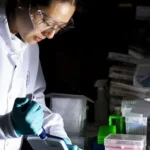Scientists in China have developed a new chemical mixture that allows brain tissues to function again after freezing. The solution, made from methylcellulose, ethylene glycol, and other components, protects brain cells from damage during freezing and thawing. As a result, organoids retain their functions and structure even after 18 months of freezing and, overall, develop similarly to tissues that have not been cooled. This method could revolutionize organ transplantation and biomedical research.
Freezing is an effective way to prevent the decomposition of organic materials. However, it still damages them. When internal water turns into ice, ice crystals rupture cells. This is why frozen meat or fruits become soft after thawing. The same happens with organs or tissues cooled for transplantation or research.

Scientists from Fudan University in China experimented with various chemical compounds to determine which ones are suitable for preserving live brain tissue during freezing. Researchers tested promising chemical substances on brain organoids—small pieces of brain tissue grown in the laboratory that develop into various types of related cells.
These organoids were immersed in various chemical solutions, then frozen in liquid nitrogen for 24 hours. They were quickly thawed in warm water and monitored for functions, growth, and signs of cell damage for some time. The most effective chemical substances that protected these “mini-brains” moved on to the second stage of the study. At this stage, various combinations of these substances were tested in similar freezing and thawing processes.
Ultimately, researchers settled on the most promising mixture, which they called MEDY, after the first letters of its four main components: methylcellulose, ethylene glycol, dimethyl sulfoxide (DMSO), and Y27632 inhibitor.
The team grew organoids of different ages, from four weeks to over three months. Then they froze them in MEDY solution, thawed them, and observed them for several more weeks. Organoids preserved in MEDY showed similar growth and functioning patterns to those that were never frozen. One batch of organoids was frozen in MEDY for a full 18 months and still exhibited the same protection from damage after thawing.
The research team also froze samples of live brain tissue obtained from an epilepsy patient and found that MEDY protected them from damage. This process did not disrupt the structure of brain cells and even preserved the pathological features of epilepsy. This is important because it allows samples to be frozen for further study or analysis without the risk of freezing-induced damage distorting the results.
The new technology will allow long-term storage of organoids and brain tissue samples for biomedical research. In the future, this method could be applied to freeze whole brains and other tissues.











